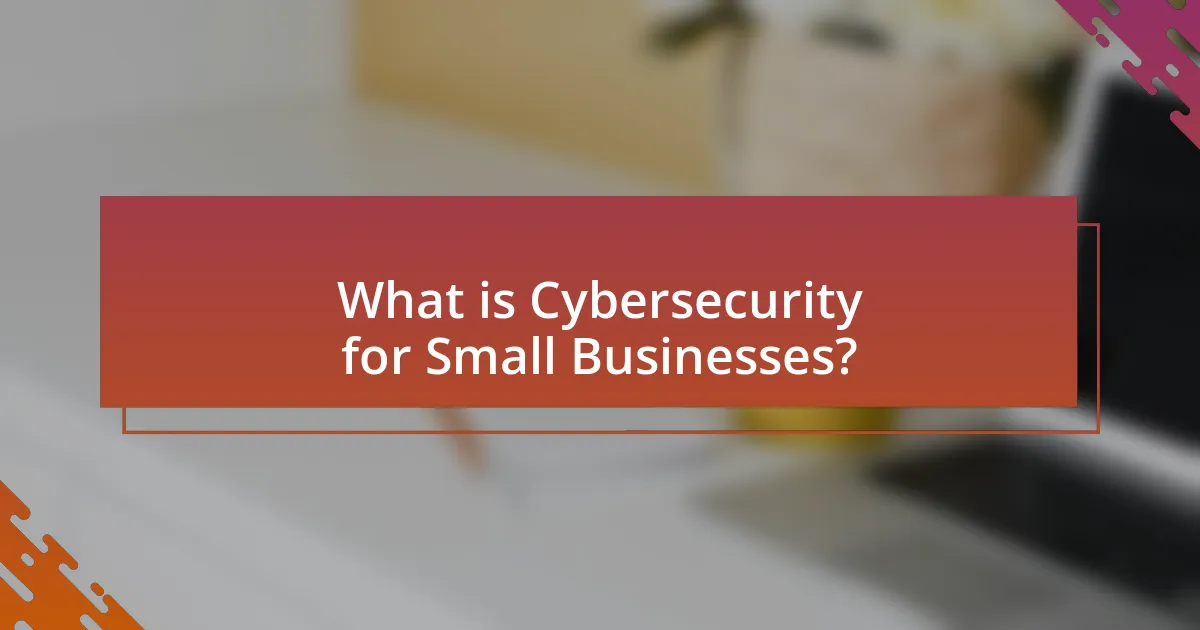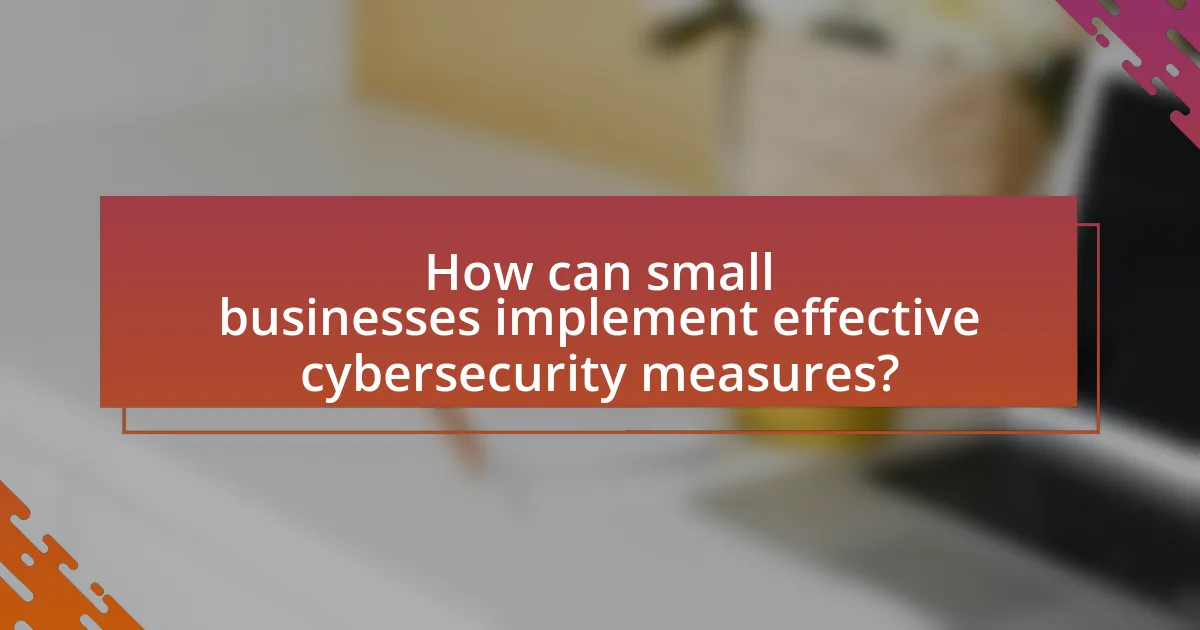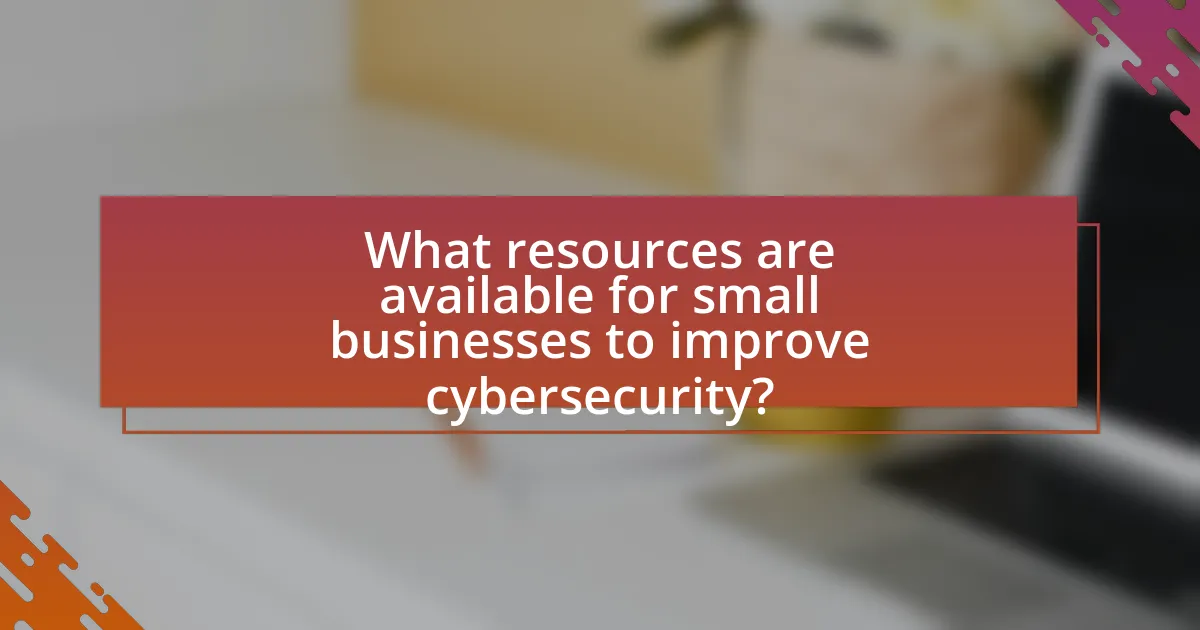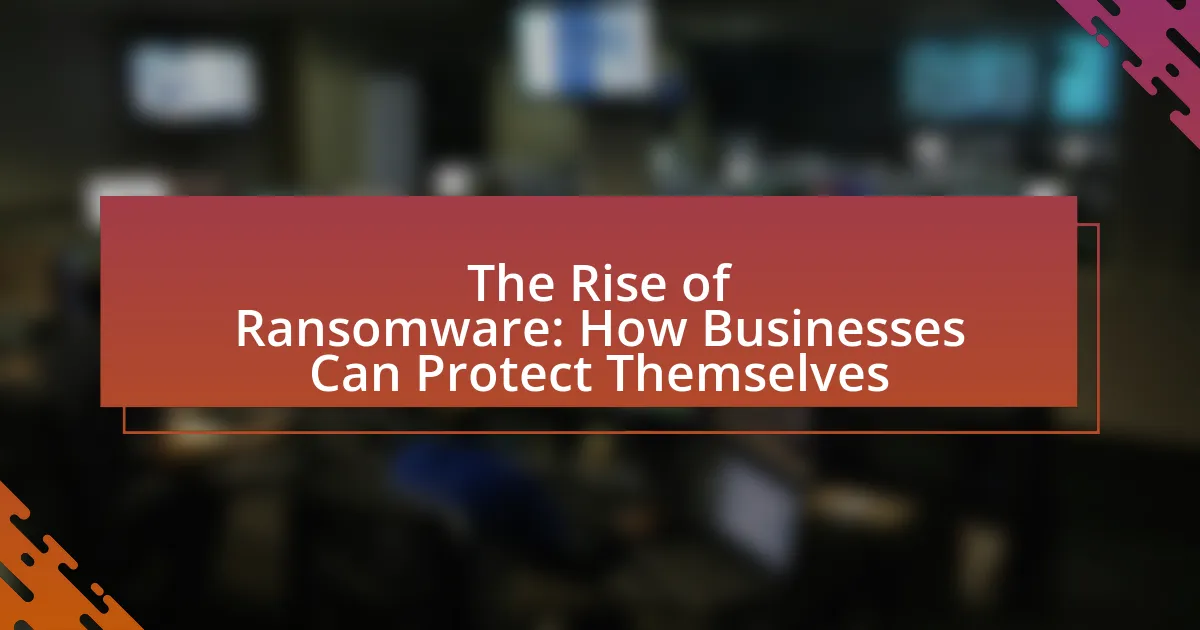Cybersecurity for small businesses encompasses the practices and technologies designed to protect sensitive data and systems from cyber threats. With 43% of data breaches involving small businesses, the article highlights the importance of implementing effective cybersecurity measures, including firewalls, antivirus software, employee training, and regular system updates. It discusses the unique challenges small businesses face, such as limited resources and expertise, and outlines key components of a cybersecurity strategy, common threats, and best practices for enhancing security. Additionally, the article emphasizes the role of risk assessments, incident response plans, and available resources to help small businesses improve their cybersecurity posture.

What is Cybersecurity for Small Businesses?
Cybersecurity for small businesses refers to the practices and technologies that protect sensitive data and systems from cyber threats. Small businesses often face unique challenges, including limited resources and expertise, making them attractive targets for cybercriminals. According to the 2021 Verizon Data Breach Investigations Report, 43% of data breaches involve small businesses, highlighting the critical need for effective cybersecurity measures. Implementing strategies such as firewalls, antivirus software, employee training, and regular system updates can significantly reduce vulnerabilities and enhance overall security.
Why is cybersecurity important for small businesses?
Cybersecurity is crucial for small businesses because it protects sensitive data from cyber threats, which can lead to financial loss and reputational damage. Small businesses are often targeted by cybercriminals due to their perceived lack of security measures; in fact, according to the 2021 Verizon Data Breach Investigations Report, 43% of data breaches involve small businesses. Implementing robust cybersecurity measures not only safeguards customer information but also ensures compliance with regulations, thereby maintaining trust and credibility in the marketplace.
What are the unique cybersecurity challenges faced by small businesses?
Small businesses face unique cybersecurity challenges primarily due to limited resources and expertise. These businesses often lack dedicated IT staff, making it difficult to implement robust security measures. According to a 2021 report by the Cybersecurity & Infrastructure Security Agency, 43% of cyberattacks target small businesses, highlighting their vulnerability. Additionally, small businesses frequently use outdated software and hardware, which can be exploited by cybercriminals. The combination of these factors creates an environment where small businesses are at a higher risk of data breaches and cyberattacks, underscoring the need for tailored cybersecurity strategies.
How do small businesses differ from larger organizations in terms of cybersecurity needs?
Small businesses differ from larger organizations in terms of cybersecurity needs primarily due to their limited resources and expertise. Small businesses often lack dedicated IT security teams, making them more vulnerable to cyber threats. According to a 2021 report by the Cybersecurity & Infrastructure Security Agency (CISA), 43% of cyberattacks target small businesses, highlighting their increased risk. Additionally, small businesses typically have fewer security protocols and less sophisticated technology compared to larger organizations, which can invest in comprehensive cybersecurity measures and staff training. This disparity necessitates tailored cybersecurity strategies for small businesses, focusing on cost-effective solutions and basic security practices to mitigate risks.
What are the key components of a cybersecurity strategy for small businesses?
The key components of a cybersecurity strategy for small businesses include risk assessment, employee training, data protection, incident response planning, and regular software updates. Risk assessment allows businesses to identify vulnerabilities and prioritize security measures. Employee training is crucial, as human error is a leading cause of security breaches; educating staff on phishing and safe practices can significantly reduce risks. Data protection involves implementing encryption and secure backup solutions to safeguard sensitive information. Incident response planning ensures that businesses are prepared to react swiftly to security incidents, minimizing damage. Regular software updates are essential to protect against known vulnerabilities, as outdated systems are prime targets for cyberattacks. These components collectively create a robust cybersecurity framework tailored to the unique needs of small businesses.
What role do firewalls play in protecting small businesses?
Firewalls serve as a critical line of defense for small businesses by monitoring and controlling incoming and outgoing network traffic based on predetermined security rules. They protect sensitive data from unauthorized access, cyberattacks, and malware by filtering traffic and blocking potentially harmful connections. According to a report by Cybersecurity Ventures, cybercrime is projected to cost businesses over $10.5 trillion annually by 2025, highlighting the importance of firewalls in mitigating these risks. By implementing firewalls, small businesses can significantly reduce their vulnerability to cyber threats, ensuring the integrity and confidentiality of their information.
How can antivirus software safeguard small business operations?
Antivirus software can safeguard small business operations by detecting, preventing, and removing malware and other cyber threats. This protection is crucial as small businesses often lack the resources to recover from data breaches, which can cost an average of $200,000, according to a study by the Ponemon Institute. By continuously scanning for vulnerabilities and providing real-time threat detection, antivirus software helps maintain the integrity of sensitive business data and ensures compliance with regulations. Furthermore, it can block phishing attempts and malicious downloads, reducing the risk of financial loss and reputational damage.
What are the common cybersecurity threats targeting small businesses?
Common cybersecurity threats targeting small businesses include phishing attacks, ransomware, malware, and insider threats. Phishing attacks, which involve deceptive emails to trick employees into revealing sensitive information, accounted for 90% of data breaches in 2020, according to the Verizon Data Breach Investigations Report. Ransomware, which encrypts data and demands payment for decryption, has increasingly targeted small businesses, with a 150% rise in attacks reported in 2020. Malware, including viruses and spyware, can compromise systems and steal data, while insider threats, often from disgruntled employees or negligent staff, can lead to significant data breaches. These threats highlight the need for robust cybersecurity measures tailored to the vulnerabilities of small businesses.
What is phishing and how does it affect small businesses?
Phishing is a cyber attack that involves tricking individuals into providing sensitive information, such as passwords or credit card numbers, by masquerading as a trustworthy entity in electronic communications. Small businesses are particularly vulnerable to phishing attacks, as they often lack robust cybersecurity measures and employee training. According to the 2021 Verizon Data Breach Investigations Report, 36% of data breaches involved phishing, highlighting the significant risk it poses. The consequences for small businesses can include financial loss, reputational damage, and legal liabilities, as compromised data can lead to identity theft and fraud.
How can ransomware impact small business operations?
Ransomware can severely disrupt small business operations by encrypting critical data and demanding payment for its release. This disruption can lead to significant downtime, loss of revenue, and damage to customer trust. According to a report by Cybersecurity Ventures, the global cost of ransomware is expected to reach $265 billion by 2031, highlighting the financial impact on businesses. Additionally, small businesses often lack the resources for robust cybersecurity measures, making them more vulnerable to attacks. A study by the National Cyber Security Alliance found that 60% of small businesses that experience a cyber attack go out of business within six months, underscoring the potential long-term consequences of ransomware on their operations.

How can small businesses implement effective cybersecurity measures?
Small businesses can implement effective cybersecurity measures by adopting a multi-layered security approach that includes employee training, strong password policies, regular software updates, and the use of firewalls and antivirus software. Employee training is crucial, as studies show that human error accounts for 95% of cybersecurity breaches, highlighting the need for awareness and best practices. Strong password policies, such as requiring complex passwords and regular changes, can significantly reduce unauthorized access. Regular software updates ensure that vulnerabilities are patched, as 60% of breaches involve unpatched software. Additionally, firewalls and antivirus software act as essential barriers against malware and unauthorized access, providing a foundational layer of protection.
What steps should small businesses take to assess their cybersecurity risks?
Small businesses should conduct a comprehensive cybersecurity risk assessment by identifying assets, evaluating vulnerabilities, and analyzing potential threats. First, businesses must inventory all digital and physical assets, including hardware, software, and data. Next, they should assess vulnerabilities by reviewing security policies, employee training, and existing security measures. Finally, businesses need to analyze potential threats by considering both external factors, such as cyberattacks, and internal factors, such as employee negligence. According to the Cybersecurity & Infrastructure Security Agency, 60% of small businesses that experience a cyberattack go out of business within six months, highlighting the importance of thorough risk assessment.
How can a risk assessment help identify vulnerabilities?
A risk assessment helps identify vulnerabilities by systematically evaluating potential threats and weaknesses within an organization’s systems and processes. This evaluation involves analyzing assets, identifying potential risks, and assessing the impact of those risks on business operations. For instance, a study by the National Institute of Standards and Technology (NIST) emphasizes that risk assessments provide a structured approach to uncovering security gaps, enabling businesses to prioritize their cybersecurity efforts effectively. By identifying vulnerabilities, organizations can implement targeted measures to mitigate risks, thereby enhancing their overall security posture.
What tools can assist in conducting a cybersecurity risk assessment?
Tools that can assist in conducting a cybersecurity risk assessment include risk assessment frameworks, vulnerability scanners, and security information and event management (SIEM) systems. Risk assessment frameworks such as NIST SP 800-30 provide structured methodologies for identifying and evaluating risks. Vulnerability scanners like Nessus and Qualys automate the detection of security weaknesses in systems and networks. SIEM systems, such as Splunk and IBM QRadar, aggregate and analyze security data to identify potential threats. These tools are essential for small businesses to systematically assess their cybersecurity posture and implement effective risk management strategies.
What best practices should small businesses follow for cybersecurity?
Small businesses should implement strong password policies, regularly update software, and conduct employee training to enhance cybersecurity. Strong password policies include using complex passwords and enabling two-factor authentication, which significantly reduces the risk of unauthorized access. Regular software updates patch vulnerabilities, as 60% of data breaches occur due to unpatched software, according to the Verizon Data Breach Investigations Report. Employee training raises awareness about phishing attacks and social engineering tactics, which are responsible for 90% of data breaches, as highlighted by the 2021 Cybersecurity Workforce Study by (ISC)². By following these best practices, small businesses can effectively mitigate cybersecurity risks.
How can employee training enhance cybersecurity awareness?
Employee training enhances cybersecurity awareness by equipping staff with the knowledge and skills necessary to recognize and respond to cyber threats. Training programs often include simulations of phishing attacks, which have been shown to reduce susceptibility to such threats by up to 70% when employees are educated on identifying suspicious emails. Furthermore, regular training sessions reinforce best practices, such as password management and safe browsing habits, leading to a more security-conscious workplace culture. Research indicates that organizations with comprehensive cybersecurity training programs experience fewer security incidents, highlighting the effectiveness of training in fostering a proactive approach to cybersecurity.
What policies should be established to ensure data protection?
To ensure data protection, small businesses should establish comprehensive data governance policies that include data encryption, access controls, regular audits, and employee training. Data encryption protects sensitive information by converting it into a secure format, making it unreadable without the proper decryption key. Access controls limit data access to authorized personnel only, reducing the risk of unauthorized data breaches. Regular audits help identify vulnerabilities and ensure compliance with data protection regulations, such as the General Data Protection Regulation (GDPR), which mandates strict data handling practices. Employee training is crucial, as it raises awareness about phishing attacks and safe data handling practices, significantly reducing the likelihood of human error leading to data breaches.
What tools and technologies are essential for small business cybersecurity?
Essential tools and technologies for small business cybersecurity include firewalls, antivirus software, intrusion detection systems, and secure backup solutions. Firewalls act as barriers between trusted internal networks and untrusted external networks, helping to prevent unauthorized access. Antivirus software protects against malware and other malicious threats by detecting and removing harmful software. Intrusion detection systems monitor network traffic for suspicious activity, providing alerts for potential breaches. Secure backup solutions ensure that critical data is regularly backed up and can be restored in case of data loss or ransomware attacks. According to the Cybersecurity & Infrastructure Security Agency (CISA), implementing these tools significantly reduces the risk of cyber threats for small businesses.
What are the benefits of using a VPN for small businesses?
Using a VPN provides small businesses with enhanced security, privacy, and remote access capabilities. A VPN encrypts internet traffic, protecting sensitive data from cyber threats and unauthorized access, which is crucial for maintaining client trust and compliance with data protection regulations. Additionally, it allows employees to securely connect to the company network from remote locations, facilitating flexible work arrangements and improving productivity. According to a report by Cybersecurity Ventures, businesses that implement VPNs can reduce the risk of data breaches by up to 80%, highlighting the effectiveness of this tool in safeguarding business information.
How can cloud security solutions protect small business data?
Cloud security solutions protect small business data by implementing advanced encryption, access controls, and continuous monitoring. These measures ensure that sensitive information is safeguarded against unauthorized access and data breaches. For instance, encryption protects data both in transit and at rest, making it unreadable to anyone without the proper decryption keys. Access controls limit who can view or modify data, reducing the risk of insider threats. Continuous monitoring detects suspicious activities in real-time, allowing for immediate response to potential threats. According to a report by Cybersecurity Ventures, global spending on cloud security is projected to reach $12.6 billion by 2024, highlighting the increasing reliance on these solutions for data protection.

What resources are available for small businesses to improve cybersecurity?
Small businesses can access various resources to improve cybersecurity, including government programs, online training, and cybersecurity frameworks. The U.S. Small Business Administration (SBA) offers resources like the Cybersecurity for Small Business guide, which provides actionable steps for enhancing security. Additionally, the National Institute of Standards and Technology (NIST) offers the Cybersecurity Framework, a comprehensive guide that helps organizations manage and reduce cybersecurity risk. Online platforms such as Cyber Aware and the Federal Trade Commission (FTC) provide free training and tools tailored for small businesses. These resources are validated by their widespread use and endorsement by cybersecurity experts and government agencies, ensuring they are effective for improving cybersecurity measures.
What government and industry resources can assist small businesses?
Government and industry resources that assist small businesses include the Small Business Administration (SBA), which provides funding options, training, and resources for business development. Additionally, the Cybersecurity and Infrastructure Security Agency (CISA) offers guidance and tools specifically aimed at improving cybersecurity practices among small businesses. The SBA’s Office of Advocacy also conducts research and provides data that can help small businesses understand their market and regulatory environment. Furthermore, industry associations, such as the National Cyber Security Alliance, offer resources and best practices for enhancing cybersecurity measures. These organizations collectively support small businesses by providing essential information, funding opportunities, and training programs tailored to their needs.
How can small businesses leverage cybersecurity frameworks and guidelines?
Small businesses can leverage cybersecurity frameworks and guidelines by adopting established standards such as the NIST Cybersecurity Framework or ISO/IEC 27001. These frameworks provide structured approaches to managing cybersecurity risks, enabling small businesses to identify, protect, detect, respond to, and recover from cyber threats effectively. For instance, according to a 2020 report by the Cybersecurity & Infrastructure Security Agency (CISA), organizations that implement these frameworks experience a 50% reduction in security incidents. By following these guidelines, small businesses can enhance their security posture, ensure compliance with regulations, and build customer trust, ultimately leading to improved business resilience against cyber threats.
What role do cybersecurity insurance policies play for small businesses?
Cybersecurity insurance policies play a critical role for small businesses by providing financial protection against losses resulting from cyber incidents. These policies help mitigate the financial impact of data breaches, ransomware attacks, and other cyber threats, which can be particularly devastating for smaller organizations with limited resources. According to a report by the Ponemon Institute, the average cost of a data breach for small businesses can exceed $120,000, making insurance a vital tool for risk management. By covering expenses such as legal fees, notification costs, and potential regulatory fines, cybersecurity insurance enables small businesses to recover more swiftly and maintain operational continuity after a cyber event.
What are the common pitfalls small businesses should avoid in cybersecurity?
Small businesses should avoid common pitfalls in cybersecurity such as neglecting employee training, failing to implement strong password policies, and not regularly updating software. Neglecting employee training can lead to human error, which is responsible for 95% of cybersecurity breaches according to a report by the Cybersecurity and Infrastructure Security Agency. Failing to implement strong password policies increases vulnerability, as weak passwords are easily compromised; a study by Verizon found that 81% of hacking-related breaches involve stolen or weak passwords. Additionally, not regularly updating software leaves systems exposed to known vulnerabilities, as 60% of breaches are linked to unpatched software, according to the Ponemon Institute.
How can neglecting software updates lead to security breaches?
Neglecting software updates can lead to security breaches by leaving systems vulnerable to known exploits. Software developers regularly release updates to patch security vulnerabilities that cybercriminals can exploit; when these updates are ignored, attackers can easily infiltrate systems. For instance, the 2017 Equifax breach, which exposed sensitive data of 147 million people, was largely attributed to the failure to apply a critical security patch in a timely manner. This demonstrates that outdated software can serve as an open door for malicious activities, significantly increasing the risk of data breaches and financial loss for businesses.
What mistakes should small businesses avoid when selecting cybersecurity tools?
Small businesses should avoid the mistake of selecting cybersecurity tools without conducting a thorough needs assessment. A needs assessment helps identify specific vulnerabilities and requirements, ensuring that the chosen tools effectively address the unique risks faced by the business. Additionally, small businesses often overlook the importance of scalability; selecting tools that cannot grow with the business can lead to increased costs and inefficiencies in the future.
Another common mistake is failing to consider user-friendliness; complex tools may lead to poor adoption among employees, undermining the effectiveness of the cybersecurity measures. Furthermore, small businesses should avoid relying solely on price as a determining factor; cheaper options may lack essential features or support, ultimately compromising security.
Lastly, neglecting to evaluate vendor reputation and support can result in inadequate assistance during critical incidents. According to a report by Cybersecurity Ventures, 60% of small businesses that suffer a cyber attack go out of business within six months, highlighting the importance of making informed decisions when selecting cybersecurity tools.
What practical tips can small businesses implement for better cybersecurity?
Small businesses can enhance their cybersecurity by implementing strong password policies, regularly updating software, and conducting employee training. Strong password policies, which include using complex passwords and enabling two-factor authentication, significantly reduce the risk of unauthorized access. Regular software updates patch vulnerabilities; for instance, 60% of breaches occur due to unpatched software. Employee training on recognizing phishing attempts and safe internet practices is crucial, as human error accounts for 95% of cybersecurity incidents. By adopting these practical measures, small businesses can create a more secure digital environment.
How can regular security audits improve a small business’s cybersecurity posture?
Regular security audits enhance a small business’s cybersecurity posture by identifying vulnerabilities and ensuring compliance with security standards. These audits systematically evaluate the effectiveness of existing security measures, allowing businesses to address weaknesses before they can be exploited by cyber threats. For instance, a study by the Ponemon Institute found that organizations conducting regular security assessments experienced 50% fewer data breaches compared to those that did not. This proactive approach not only mitigates risks but also fosters a culture of security awareness among employees, further strengthening the overall cybersecurity framework.
What are the key elements of an incident response plan for small businesses?
The key elements of an incident response plan for small businesses include preparation, detection and analysis, containment, eradication, recovery, and post-incident review. Preparation involves establishing policies, training staff, and ensuring necessary tools are in place. Detection and analysis focus on identifying incidents through monitoring systems and analyzing the nature of the threat. Containment aims to limit the impact of the incident, while eradication involves removing the threat from the environment. Recovery ensures that systems are restored to normal operations, and post-incident review assesses the response to improve future plans. These elements are essential for effectively managing cybersecurity incidents, as highlighted by the National Institute of Standards and Technology (NIST) in their Special Publication 800-61, which outlines best practices for incident handling.




